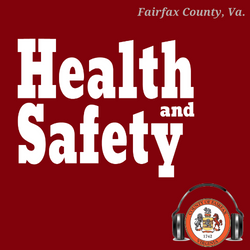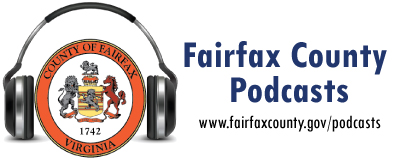Feb. 4, 2026
Hello, and welcome to the Fairfax County Health and Safety Podcast. Coming up, learn about giving the gift of preparedness this Valentine’s Day, extreme cold weather safety and hypothermia. Links to topics mentioned in this podcast can be found online at www.fairfaxcounty.gov.
February is a month full of spreading love to your family, friends, and community – and one of the best ways of spreading that love is making sure everyone is prepared for emergencies. Help get your loved ones thinking about emergency preparedness this Valentine’s Day with a unique gift. You can get your valentine started on their emergency kit by putting together a starter bag with one or all the following items:
- First aid kit
- Flashlight and extra batteries
- Weather radio and extra batteries
- Portable phone charger
- Manual can opener
Emergency kits include basic supplies and are tailored to every person’s needs. You will need additional supplies if your household has children, seniors, individuals with access and functional needs, or pets. Kits should be kept in a water-resistant container or a sturdy, transportable bag, and stored in a location where they will be both useful and accessible when needed. Every household keeps three to five days' worth of food, water, and supplies in their shelter-in-place kits for each member of the household. For additional information and a complete checklist of items to include in your emergency kit, visit fairfaxcounty.gov/emergencymanagement/cerg.
It’s important to protect yourself this winter, especially during extreme cold.
- Dress in layers and cover exposed skin.
- Limit time outdoors and avoid prolonged exposure.
- Protect water lines; tips from Fairfax Water: www.fairfaxwater.org/news/winter-weather-info
- Check on neighbors, especially older adults or those without adequate heat.
Frostbite and hypothermia can develop quickly in extreme cold. Know the warning signs and seek help immediately if symptoms appear.
To stay safe during winter weather, keep these tips in mind:
- For Commuters: Check Before You Go: Before heading out, check the latest traffic and weather reports. Consider teleworking if your employer allows.
- Slow Down: Increase your following distance. It takes much longer to stop on icy or slushy roads.
- Clear Your Vehicle: Ensure your windows, lights and roof are completely clear of snow and ice before driving.
- Keep an Emergency Kit: Your car should be stocked with a blanket, ice scraper, flashlight and jumper cables.
For Your Home and Family:
- Layer Up: If you must go outside, wear several layers of loose-fitting, lightweight, warm clothing. Don’t forget a hat and gloves—most body heat is lost through the head and extremities.
- Protect Your Pipes: Allow faucets to drip slightly to prevent pipes from freezing and bursting.
- Check on Neighbors: Take a moment to check on elderly neighbors or those with functional needs to ensure they have adequate heat and supplies.
- Bring Pets Indoors: If it’s too cold for you, it’s too cold for them. Ensure pets have a warm, dry place to stay.
Learn more on our emergency blog; fairfaxcounty.gov/emergency/blog.
If you see an unsheltered person who may be at risk of hypothermia, call the police non-emergency phone line at 703-691-2131. To learn more about our Hypothermia Prevention Program, including shelter locations, visit fairfaxcounty.gov/news/hypothermia-prevention.
Finally, Fairfax County's free alert system sends you important information during an emergency, helps you navigate your commute and shares community information. You can also customize your Fairfax Alerts to receive the information pertinent to you. Don't miss this important information! Sign up today for Fairfax Alerts at www.fairfaxcounty.gov/alerts.
That’s it for this edition of the Fairfax County Health and Safety Podcast, produced by the Fairfax County, Va., Government. Thanks for listening. Additional information about health and safety topics and emergency preparedness may be found on our emergency information blog at www.fairfaxcounty.gov/emergency/blog. Follow the Health and Safety podcast on soundcloud.com/fairfaxcounty and our podcasts webpage, fairfaxcounty.gov/podcasts. And remember, if you have a police, fire, or medical emergency, call 9-1-1. For non-emergency needs, call 703-691-2131.



 Listen Online or On the Go.
Listen Online or On the Go.